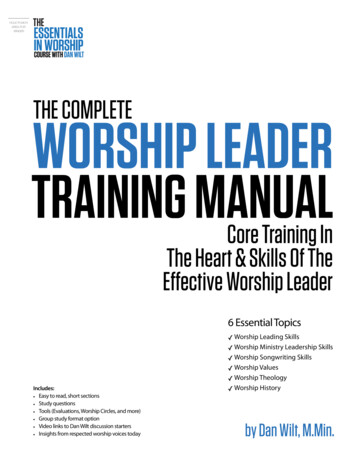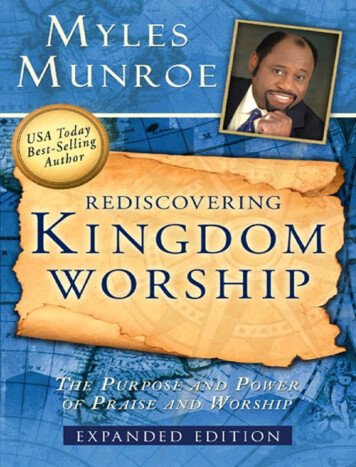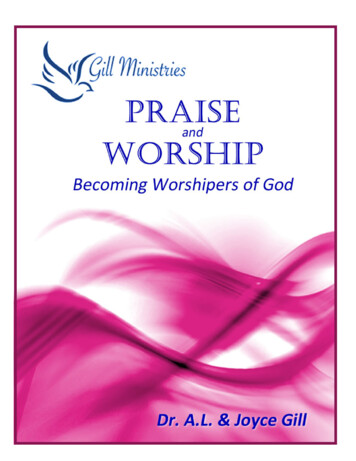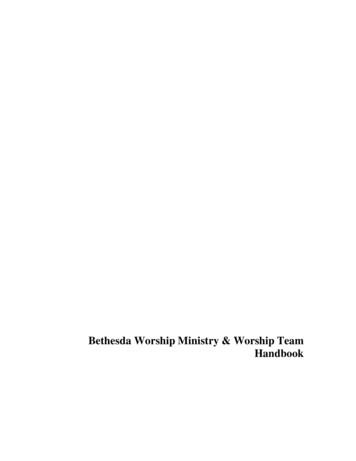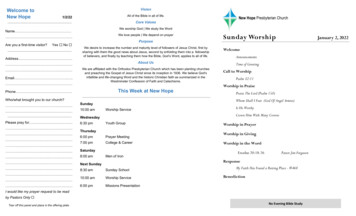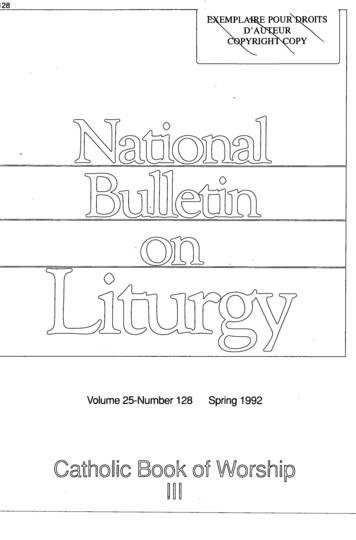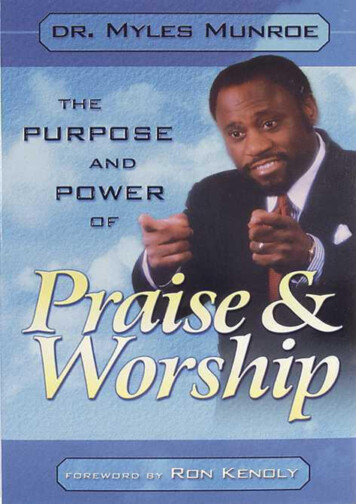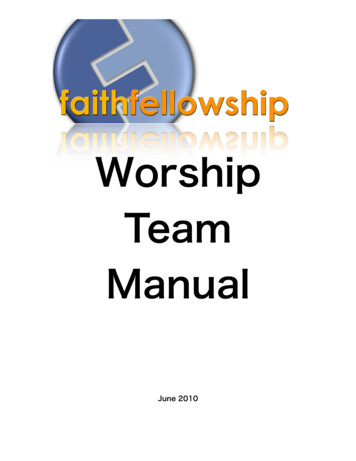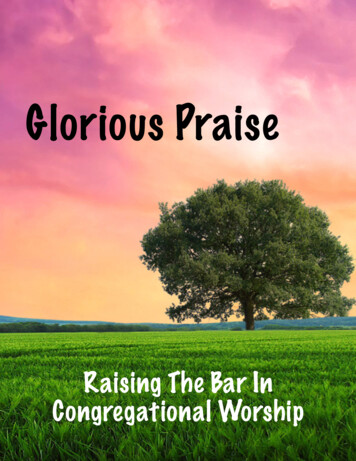
Transcription
Glorious PraiseRaising The Bar InCongregational Worship
Worship Leader Training, Session IIGlorious Praise: Raising the Bar in Congregational Worship!!ScheduleOpening MessageThe Treasury of Worship Wisdom: Insights from the PsalmsDave Eastman, Central Ministry Center!Workshop: Building Excellence in your Worship Team!Discussion #1: How To Build A Great Worship TeamHere we will talk about the elements of a team, building family, reasonablerehearsal expectations, how to run a rehearsal, etc.(Dave, Tina Crawley)!Discussion #2: Great Expectations (Dave, Tina, Jaime Turish)!Discussion #3: Preparing our Mind & Attitude For Worship (Tina)!Discussion #4: The Science of Sound (Jaime)!Discussion #5: Blended Worship - A discussion of Song & Styleselection (Dave & Tina)!Specialized Discussion #1: Excellence in the Visual Arts!Specialized Discussion #2: Excellence in Sound Engineering!Guest SpeakersTina Crawley: Tina is a professional recording artist and worship leaderwho has produced worship albums, music videos and more.!Jaime Turish: Jaime is a former El Salvadoran recording artist and recordproducer. Currently he is the president of Proyecto Alabanza and videoproducer for “Life-Changing Worship”.!Gino Pack: Gino is our Media Guy Extraordinaire, who serves on our audio /visual team, and is fluent in ProPresenter, MediaShout, and other softwareapplications.!Brandon Sitzberger: Brandon is an expert in sound engineering. He serveswith the worship team in the North Suburban Ministry Center.!!!
!!Opening MessageThe Treasury of Worship Wisdom: Insights from the PsalmsDave EastmanLesson: Six Hebrew Words / Read Ephesians 5:19 Enjoined to Sing Directed to the Psalms – “Psalms, Hymns and Spiritual Songs” all areterms used to describe what we have in the book of Psalms. There is abranch of the Presbyterian Church that believes this is all we should sing.Biblically, you can’t really make a case for exclusiveness, but there is nodoubt that all three of these phrases are used to refer to the 150 Psalms ofthe Old Testament. For a worship leader, the Psalms is your book. It is the handbook ofHallelujahs, the Wikipedia of Worship, your personal Ark of Adoration.We need to love it, read it, ruminate on it, memorize it, know it, examineit, live it, teach it, and exemplify it in every session of praise! Challenge: Seek to dig out the SPIRIT of the Psalms. What do thePsalmists feel? How do they act in worship? How do they expressthemselves? In what ‘attitude’ do they approach the throne?!1st Word: Exalt / Read Psalm 145:1-2Rûm, room. A primitive root; to rise or raise (in various applications, literallyor figuratively).!This thought is about intentionality in Worship. What the Biblical Worshipperseeks to do is to lift his eyes upward, to direct attention to the fact that God isGod, and we are not.!2nd Word: Shout / Read Psalm 47:1Rûa‛: to shout, raise a sound, cry out, give a blast, sound a signal for war, toshout in triumph, to shout in applause, to shout with religious impulse!3rd Word: Shout OR Acclaim / Read Psalm 47:5Terû‛âh. This word shares the same root. (Rua/ Teruah). It’s a rowdy word,an energetic word. When is the last time you gave a joyful shout in your service?There is an expectation here. Those who learn to make some noise in worshipwill witness God ascending! Read Psalm 89:15-16!This is a not-well-kept secret to walking with God. When we learn to give thejoyful shout, when we learn to ‘acclaim’ his praise, then we will walk in the lightof his presence. Think about the power of that! If you and I can master thispractice, think of the power that we will have in our lives — over temptation, overfear, over anxiety.!
4th & 5th Words: Give Thanks / Read Psalm 63:4Yadah & Todah — both of these words mean to stretch out the hand in praiseand thanksgiving. What is this all about? A soldier, surrendering A child, appealing to his or her parents A student, getting the teacher’s attention!6th Word: Be Still / Read Psalm 46:10Shâbar - to break (down, off, in pieces, up), broken ([-hearted]), bring to thebirth, crush. 13 Hebrew Verbs - ponder, be silent, watch, gaze, wait, stand inawe, delight, be still, meditate, find rest, remember, think, consider. We need tolearn what it means to meditate. Discussion of “Ruminate”.!Every one of these worship words has to do with specific actions that eachworshipper should take when worshipping. That brings me to the question of theworship band. What is the purpose of a band or of a backing track? Comingfrom a 250-year tradition of a cappella, four-part harmony, we always want tohighlight the lyrical component of each song we sing. The band exists to providea melody and tasteful, volume-appropriate backing music so that the lyricalmessage is clearly enunciated. Songs have a didactic and inspirational purpose.Both of these purposes are served when the entire church enjoys and participatesin worship.!From time to time, you may do a special song featuring a soloist or small group,but the band is not there to entertain; its purpose is to facilitate participation bythe entire congregation.!Concluding Thoughts & Questions!The question we ought to often ask ourselves To what degree has our teamrestored the Spirit of Biblical Worship in our congregation? What are some areasI should work on? What are the questions I should ask? Are we Intentional? Do we set out to plan services that provide a“connecting point” for each disciple? Do we enter his gates withthanksgiving? Are we Energetic? Do we expend energy in worship? Are calories beingburned in the audience? Are We Expressive? Are we appropriately Emotional? Do we allow for enthusiasm, or do wesquelch it? Are we Meditative? Do we ever enjoy periods of silent meditation, or dowe feel the need to fill every minute with sound?!!!!
!!Workshop: How to Build A Great Worship TeamGuest Speakers – Tina Crawley, Jaime TurishDiscussion #1: How To Build A Great Worship TeamHere we will talk about the elements of a team, building family, reasonablerehearsal expectations, how to run a rehearsal, etc.!The Elements of a Great Worship Team (Intro, Dave) The Singers – you want to always have the S-A-T-B parts represented.We recommend that you set up interchangeable teams of people, andpepper your best talent around so that each team can be consistentlycalled higher. The Band – You have to have here a group of committed people who reallylove to serve in this way, and if you are blessed with a bunch ofmusicians, you can interchange people as needed. For example, ourmain bass player is a professional cellist, one of our song leaders playskeyboard, bass & guitar, one of our keyboard guys also plays guitar, andour acoustic guitarist is a gifted bassist. Mix and Match. Have somefun. The Audio Crew (includes technicians and transportation guys) – wehave three teams, and they generally go one month on, two months off.Each team has at least one technician and one transportation guy. The Media Crew – we have two media people, so they go month on,month off. The Artistic Crew – if you own a building, you are blessed, and in thisarea you really have no limitations beyond your budget and thepreferences of your leadership team. You can use banners, plants,flowers and more to make things special. The Dramatic Crew – our primary crew is the Spoken Word Team. Wehave had great actors in the past, but they have moved to differentcongregations.!Sharing: How to Build Family with your Worship Team (Tina) Meet on Sunday after church in your building and bring your lunch Bring potluck items once monthly after church during your meeting Do a service activity together ( sing at a retirement center or for the sick inyour ministry center) Send out regular thank you notes after great services or just because Coordinated apparel for the stage Sharing the load (assign something for everyone to do)!!!!!
!Discussion #2 Great ExpectationsWhat does it take to be great? What is the expectation of each musician? Eachvocalist? The answer to this question is as individual as each musician. If you spent3 hours per day practicing as a kid, then you’ve developed a kind ofintimacy with your instrument. Applying your skills to our newermusic, which does not tend to be particularly complex, may not take youa lot of time. Most of us did not do that, and we really have to work at it.!Example: Metro Worship Team Meets on Sundays after church, 2x per month Songs are determined, lyrics printed, and mp3s & lyrics are sent to the choir& praise team prior to rehearsal Thursdays (twice monthly) - meeting to build a set list, including songs forthat month and a review of previously done songs.!Personal Expectations for Excellence- For the Individual 5 P’s: Proper - Preparation - Prevents - Poor - Performance Schedule personal rehearsal time weekly Rent a rehearsal space occasionally (if you don’t have access to one) RECORD YOURSELF OFTEN ( Listen too it, critique it and makeimprovements) Get mentors Use free online youtube resources — (vocalcoach.com) sUeSJ0Q) Get a vocal or instrumental teacher Use your gifts to serve as often as possible!!Discussion #3: Preparing our Mind & Attitude For Worship (Tina C) Video / Psalm 109:30 Worshippers will praise Him Worshippers will worship according to Scripture. It starts with ourrelationship with God, and it’s ALL about God and Him alone! Psalm 29:2 Ascribe to the Lord the glory due His name Worship the Lord in the splendor of His holiness Matthew 25:14-18 - Use your talents to serve the Church!!!Discussion #4: The Science of Sound (Jaime)See appendices 1 & 2 for more information
!Discussion #5: Blended Worship - Song & Style selection.(Dave & Tina) If we are truly evangelizing our areas, the church will of necessitybecome multi-cultural, multi-ethnic, and multi-generational. Our worshipshould reflect the ‘native tongue’ of all the gathered worshippers. A cappella songs & Accompanied Songs Gospel, Contemporary, Traditional & Latino!Some Thoughts Regarding Group Singing (Tina) Listen carefully Endeavor to NOT stand out Imitate: breathing & intonation, vibrato or no vibrato. Listen to successful a cappella music (Take 6, The Martins, Selah, KirkFranklin, Civil Wars, 4 Him, Keith Lancaster & A Cappella, etc)!Specialized Discussion: The Importance of Imagery and Lyrical Accuracy working toward an effective A/V Team. Comparing Available technologies andapplications. (Gino: 11 pm – 12 pm). See appendix 3 below for detailedinformation regarding different software options for church use.!!Specialized Discussion: Effective Sound Engineering – What are the keys tomaking each individual instrument sound as good as possible? How loud is tooloud? (Brandon: 12 pm – 1 pm) See appendix 2 below for a scientificexplanation of sound levels.!!!!!!!!!!!!!!!!
Appendix 1: Tips For Improving Your TeamRalph’s TipsThese thoughts come from Ralph Beerhorst, who is a professional musician bytrade and an outstanding worship leader in the Chicago Church.GROOVE: The fundamental/foundational aspect of every contemporary song isgroove. The spine of the music, around which all of the other elements hang on isthe drums and bass. If the rhythm section isn’t made up of working professionals,simplify every groove to its simplest form until it feels good. That meansstripping back any more difficult to play “extra” notes until the drummer’s kickdrum and bass player lock in.GUITARS: Other than for some very particular, specific layered effects,guitarists should not play the same type of part at the same time. The concept oflead guitarist and rhythm guitarist is fundamentally one of separating the roles oftwo guitarists—unless they are trading licks, two guitarists shouldn’t be playinglead at the same time. One should be playing rhythm/chordal parts while theother is playing a lead part (i.e. a solo or soloistic/key melodic licks). Oneguitarist on acoustic and one on electric is an easy way to avoid sonic spectrumcollisions. If one guitar is playing a “busier” chordal strumming part, the otherguitar could play a “chick’n pick’n’” kind of part—a single note rhythmic pattern.As another option, if one electric is on a distorted tone, having the other one witha clean sound also breaks up the wall of sound pleasingly. Listening to worshiptunes and pop songs and paying attention to how guitars are placed sonically in amix and how each part intertwines with each other is a key component ofdeveloping the skills to effectively reproduce and come up with musical guitarparts live.KEYBOARDS: One wonderful thing that keyboards can bring to the sonic tableis the “pad.” This is a warm chordal bed that may sound like strings, a warmsynth-type sound, or a sustained Hammond organ, to name a few options. Thenice thing about pads is that they provide a beautiful backdrop to any othersound—lead vocal, guitars etc—-because they are static/un-busy. They are a quickway to make a tune sound more “produced.’ Adding a tasteful, soft pad to a pianosound adds richness to often somewhat stark sounding piano keyboard patches.The keyboardist’s role, like that of the guitarist, will vary from tune to tune. Onone song the keyboardist might be the centerpiece of the entire song, and on thenext it could have a totally supporting role. The key is that the keyboardist andguitarist listen closely to one another so that their parts aren’t colliding in anunmusical way. It’s easy for them to occupy the same sonic space so care shouldbe taken that the parts are carefully considered to compliment/lock with oneanother.
Tips To Improve Your Worship Team(from http://www.musicademy.com)Note: Ralph has gathered these thoughts, which he whole-heartedly endorses,from the above-mentioned web page. The ideas were generated by themusicacademy.com teamPlaying Together As A Team!!!!1.Know your place in the sonic spectrum. Look at any really goodband. Every instrument is ther
Listen to successful a cappella music (Take 6, The Martins, Selah, Kirk ! Franklin, Civil Wars, 4 Him, Keith Lancaster & A Cappella, etc) Specialized Discussion: The Importance of Imagery and Lyrical Accuracy - working toward an effective A/V Team. Comparing Available technologies and applications. (Gino: 11 pm – 12 pm) . See appendix 3 below for detailed information regarding different .
